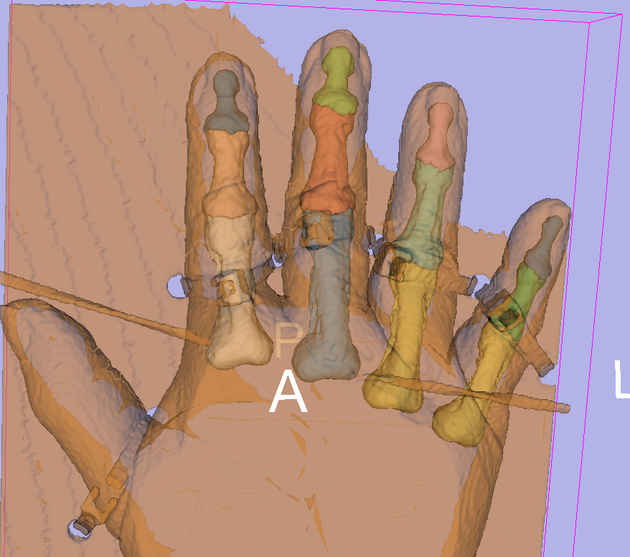Difference between revisions of "EMSegmenter-Tasks:CT-Hand-Bone"
Belhachemi (talk | contribs) (→Result) |
Belhachemi (talk | contribs) |
||
| Line 1: | Line 1: | ||
[[EMSegmenter-Tasks|Return to EMSegmenter Task Overview Page]] | [[EMSegmenter-Tasks|Return to EMSegmenter Task Overview Page]] | ||
| − | + | =Description= | |
Single channel automatic segmentation of CT hand scans into the finger bones. The task can be applied to right and and left hand scans. The pipeline consist of the following steps: | Single channel automatic segmentation of CT hand scans into the finger bones. The task can be applied to right and and left hand scans. The pipeline consist of the following steps: | ||
* Step 1: Register the atlas to the CT scan via [[Modules:BRAINSFit| BRAINSFit]] (Johnson et al 2007) | * Step 1: Register the atlas to the CT scan via [[Modules:BRAINSFit| BRAINSFit]] (Johnson et al 2007) | ||
| Line 11: | Line 11: | ||
* Step 4: Automatically segment the CT scan into the structures of interest using [[Modules:EMSegmenter-3.6|EM Algorithm]] (Pohl et al 2007) | * Step 4: Automatically segment the CT scan into the structures of interest using [[Modules:EMSegmenter-3.6|EM Algorithm]] (Pohl et al 2007) | ||
| − | + | =Anatomical Tree= | |
The anatomical tree represents the structures to be segmented. Node labels displayed below contain a human readable structure name and in parentheses the internally used structure name. | The anatomical tree represents the structures to be segmented. Node labels displayed below contain a human readable structure name and in parentheses the internally used structure name. | ||
| − | |||
| − | |||
* Hand | * Hand | ||
** Air | ** Air | ||
| Line 42: | Line 40: | ||
*** Distal (V) | *** Distal (V) | ||
| − | + | =Atlas= | |
| − | + | =Pre-Processing= | |
* Flip/Mirror the atlas (based on right hand scans) if left hand scan has to be segmented. | * Flip/Mirror the atlas (based on right hand scans) if left hand scan has to be segmented. | ||
| Line 64: | Line 62: | ||
* Register the atlas template non-linear to the subject scan. Use the linear transformation as initialization. (BRAINSDemonWarp) | * Register the atlas template non-linear to the subject scan. Use the linear transformation as initialization. (BRAINSDemonWarp) | ||
| − | + | =Result= | |
<gallery perrow=1: widths=630px : heights=630px> | <gallery perrow=1: widths=630px : heights=630px> | ||
| Line 70: | Line 68: | ||
</gallery> | </gallery> | ||
| − | + | =Collaborators= | |
Vincent Magnotta (University of Iowa) | Vincent Magnotta (University of Iowa) | ||
Revision as of 18:10, 21 April 2011
Home < EMSegmenter-Tasks:CT-Hand-BoneReturn to EMSegmenter Task Overview Page
Contents
Description
Single channel automatic segmentation of CT hand scans into the finger bones. The task can be applied to right and and left hand scans. The pipeline consist of the following steps:
- Step 1: Register the atlas to the CT scan via BRAINSFit (Johnson et al 2007)
- Step 1a:
- Step 1b:
- Step 1c:
- Step 2: Compute the intensity distributions for each structure
Compute intensity distribution (mean and variance) for each label by automatically sampling from the MR scan. The sampling for a specific label is constrained to the region that consists of voxels with high probability (top 95%) of being assigned to the label according to the aligned atlas.
- Step 4: Automatically segment the CT scan into the structures of interest using EM Algorithm (Pohl et al 2007)
Anatomical Tree
The anatomical tree represents the structures to be segmented. Node labels displayed below contain a human readable structure name and in parentheses the internally used structure name.
- Hand
- Air
- Tissue
- Index finger / digitus secundus (II)
- Proximal (II)
- Medial (II)
- Distal (II)
- Middle finger / digitus medius (III)
- Proximal (III)
- Medial (III)
- Distal (III)
- Ring finger / digitus annularis (IV)
- Proximal (IV)
- Medial (IV)
- Distal (IV)
- Little finger / digitus minimus (V)
- Proximal (V)
- Medial (V)
- Distal (V)
Atlas
Pre-Processing
- Flip/Mirror the atlas (based on right hand scans) if left hand scan has to be segmented.
- The atlas template scan and the subject scan are processed in the same way.
- Threshold image (based on Fiducials, TODO)
- blur image
- binary image
- extract largest component
- Register the atlas template linear to the subject scan and save the linear transformation. (BRAINSFit Rigid,Affine)
- Register the atlas template non-linear to the subject scan. Use the linear transformation as initialization. (BRAINSDemonWarp)
Result
Collaborators
Vincent Magnotta (University of Iowa)
Acknowledgment
The construction of the pipeline was supported by funding from NIH NCRR 2P41RR013218 Supplement.
Citations
- Pohl K, Bouix S, Nakamura M, Rohlfing T, McCarley R, Kikinis R, Grimson W, Shenton M, Wells W. A Hierarchical Algorithm for MR Brain Image Parcellation. IEEE Transactions on Medical Imaging. 2007 Sept;26(9):1201-1212.
- S. Warfield, J. Rexilius, P. Huppi, T. Inder, E. Miller, W. Wells, G. Zientara, F. Jolesz, and R. Kikinis, “A binary entropy measure to assess nonrigid registration algorithms,” in MICCAI, LNCS, pp. 266–274, Springer, October 2001.
- Johnson H.J., Harris G., Williams K. BRAINSFit: Mutual Information Registrations of Whole-Brain 3D Images, Using the Insight Toolkit, The Insight Journal, July 2007
- T. Vercauteren, X. Pennec, A. Perchant, N. Ayache. Symmetric Log-Domain Diffeomorphic Registration: A Demons-based Approach. MICCAI 2008
